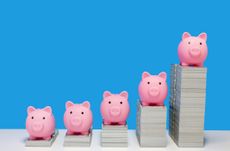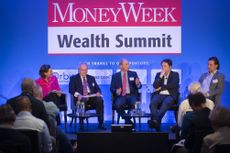Coronavirus has created a toxic backdrop for Russian stocks
Russia's stockmarket is down by about 13% since the start of 2020, with the country having the world’s third-highest number of confirmed cases opf Covid-19.
Russia began easing its Covid-19 lockdown this week. The country has the world’s third-highest number of confirmed cases. New daily infections have been running at over 10,000 in recent days. A third of the Russian economy has “ground to a halt”, writes Jake Cordell for the Moscow Times, but the government cannot afford to turn on the fiscal taps. Russia needs oil at $42 a barrel to balance the budget, far away from current prices of around $30 a barrel. The “modest” rescue package will hardly cushion the pandemic blow.
The limited stimulus is increasing the chances of a “prolonged economic downturn”, says Liam Peach for Capital Economics. The severity of the Russian outbreak means that restrictions remain tighter than in many other countries even after lockdown easing.
Already discontent with stagnant living standards, the public is souring on Vladimir Putin, whose approval rating has fallen to a 20-year low. This all makes for a politically “toxic backdrop” as Putin looks to reform the constitution in order to extend his rule beyond 2024.
Subscribe to MoneyWeek
Subscribe to MoneyWeek today and get your first six magazine issues absolutely FREE

Sign up to Money Morning
Don't miss the latest investment and personal finances news, market analysis, plus money-saving tips with our free twice-daily newsletter
Don't miss the latest investment and personal finances news, market analysis, plus money-saving tips with our free twice-daily newsletter
The Russian stockmarket soared by 39% in 2019, but is down about 13% since the start of 2020. On a price/earnings ratio of 6.7 the benchmark index is undeniably cheap, but this is partly thanks to Russia’s poor record on property rights and the rule of law, which leaves businesses at constant risk of expropriation if they get on the wrong side of the government.
-
 Barclays warns of significant rise in social media investment scams
Barclays warns of significant rise in social media investment scamsInvestment scam victims are losing an average £14k, with 61% of those falling for one over social media. Here's how to spot one and keep your money safe
By Oojal Dhanjal Published
-
 Over a thousand savings accounts now offer inflation-busting rates – how long will they stick around?
Over a thousand savings accounts now offer inflation-busting rates – how long will they stick around?The rate of UK inflation slowed again in March, boosting the opportunity for savers to earn real returns on cash in the bank. But you will need to act fast to secure the best deals.
By Katie Williams Published
-
 Halifax: House price slump continues as prices slide for the sixth consecutive month
Halifax: House price slump continues as prices slide for the sixth consecutive monthUK house prices fell again in September as buyers returned, but the slowdown was not as fast as anticipated, latest Halifax data shows. Where are house prices falling the most?
By Kalpana Fitzpatrick Published
-
 Rents hit a record high - but is the opportunity for buy-to-let investors still strong?
Rents hit a record high - but is the opportunity for buy-to-let investors still strong?UK rent prices have hit a record high with the average hitting over £1,200 a month says Rightmove. Are there still opportunities in buy-to-let?
By Marc Shoffman Published
-
 Pension savers turn to gold investments
Pension savers turn to gold investmentsInvestors are racing to buy gold to protect their pensions from a stock market correction and high inflation, experts say
By Ruth Emery Published
-
 Where to find the best returns from student accommodation
Where to find the best returns from student accommodationStudent accommodation can be a lucrative investment if you know where to look.
By Marc Shoffman Published
-
 Best investing apps
Best investing appsWe round up the best investing apps. Looking for an easy-to-use app to help you start investing, keep track of your portfolio or make trades on the go?
By Ruth Emery Last updated
-
 The world’s best bargain stocks
The world’s best bargain stocksSearching for bargain stocks with Alec Cutler of the Orbis Global Balanced Fund, who tells Andrew Van Sickle which sectors are being overlooked.
By Andrew Van Sickle Published
-
 Revealed: the cheapest cities to own a home in Britain
Revealed: the cheapest cities to own a home in BritainNew research reveals the cheapest cities to own a home, taking account of mortgage payments, utility bills and council tax
By Ruth Emery Published
-
 UK recession: How to protect your portfolio
UK recession: How to protect your portfolioAs the UK recession is confirmed, we look at ways to protect your wealth.
By Henry Sandercock Last updated